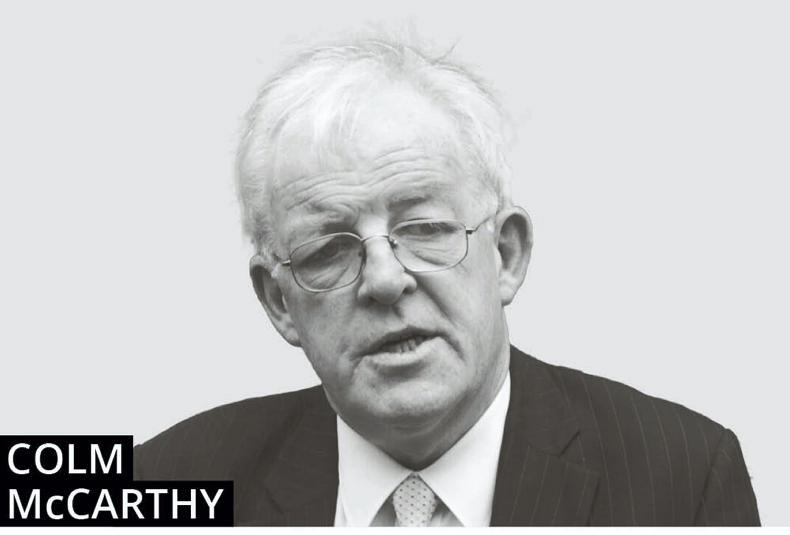Figures from the Department of Agriculture show that around 550m litres per annum of green diesel are consumed annually in tractors and harvesters by the agricultural sector.
Roughly 62% comes via farm contractors and the rest is purchased directly by farmers, either in bulk or at the pump according to FCI, the trade association of farm contractors.
At current prices, the differential in tax versus auto-diesel comes to about €300m per annum.
Green diesel, classified as MGO or motor gas oil, pays excise at a lower rate than white (road) diesel and attracts a lower VAT rate. The same is true of gas oil used for space heating in homes and other buildings.
Houses are not commonly observed cruising along the public roads and it would hardly be fair to charge them the auto-diesel rate, which helps to recover the substantial costs of building and maintaining the road system.
Most agricultural tractors rarely leave the farm
But the same is true of tractors, diggers on construction sites and stationary diesel engines. Most agricultural tractors rarely leave the farm and contractors do not send harvesters or baling equipment long distances on public roads.
Road or white diesel costs around €1.65 at the pump, green diesel around €0.90. The two products are identical, aside from the colour and have the same carbon emissions per litre. The price gap is explained mainly by differential tax treatment. There are three main tax components; excise duty, carbon tax (also collected as an excise) and both at a flat rate per litre, and VAT collected as a percentage mark-up on the price with excise included.
The lower VAT rate contributes another 10c or so, while the carbon tax per litre is about the same for green and white diesel
The difference in excise, aside from the carbon tax, is the most important component in the overall differential, amounting to over 40c per litre. The lower VAT rate contributes another 10c or so, while the carbon tax per litre is about the same for green and white diesel. And it should be – carbon emissions into the atmosphere need to be discouraged, whatever the source.
But the main element in the differential should be seen for what it is – a charge to cover the costs of providing a collective resource, the road system, and paid for by the users. Perhaps the VAT rate could be equalised, but the impact would be just a few cents per litre.
The 2019 report released last March concluded that total fossil fuel subsidies in Ireland came to €2.4bn
Regular calls for the elimination of fossil fuel subsidies have their origin in studies by the Central Statistics Office (CSO), which describes all tax discounts as subsidies and which compare actual taxes charged with a benchmark. The 2019 report released last March concluded that total fossil fuel subsidies in Ireland came to €2.4bn, provoking calls that the discounts should be scrapped. The benchmark for green diesel is auto-diesel, which makes no sense if the higher excise on auto-diesel is a user charge in disguise. Some of the discounts identified are hard to justify, but the lower rate on green diesel is not one of them.
There are three main taxes on road users – the annual tax disc, purchase taxes and taxes on fuel, and a few direct charges such as road tolls. The total revenue is roughly comparable to the annual cost of road building, maintenance and traffic policing, but the system is poorly designed and will have to change.
The main revenue source is fuel taxes and these will decline rapidly if the Government succeeds in electrifying the car fleet. Car purchase taxes (VAT and Vehicle Registration Tax) are high in Ireland, discouraging fleet renewal and it is telling that they have had to be waived to promote the adoption of electric vehicles. They have had the undesirable effect of promoting fleet replacement through the importation of older, and less fuel-efficient, used diesel cars from the UK.
Rural dwellers do higher mileage, but congestion is mainly a headache in towns and cities
A better system of collecting user charges from the road vehicle fleet would be to tax emissions, but also mileage and congestion. Rural dwellers do higher mileage, but congestion is mainly a headache in towns and cities.
Since congestion is an even bigger externality than greenhouse gas emissions, according to much international research, it is not clear that urban motorists are paying enough for peak-time journeys.
There is also no VAT on airline tickets
If tractors and harvesters never, or rarely, use the roads, should the green diesel tax gap be closed on the basis that it is a fossil fuel subsidy? Airplanes and cargo ships never use the roads either and pay no fuel taxes whatsoever, not even the carbon tax.
There is also no VAT on airline tickets. There are more obvious targets than green diesel, as Ryanair’s Michael O’Leary was candid enough to acknowledge last week. The CSO calculations on fossil fuel subsidies need to be reviewed – they follow an international measurement convention, and it is not the only one that does not favour Irish agriculture. Accurate measurement matters in designing climate policy.






 This is a subscriber-only article
This is a subscriber-only article










SHARING OPTIONS: